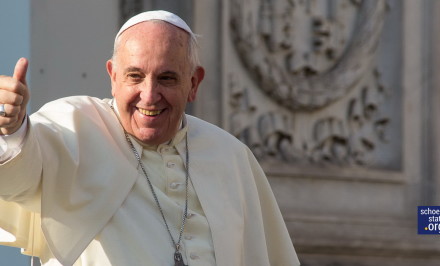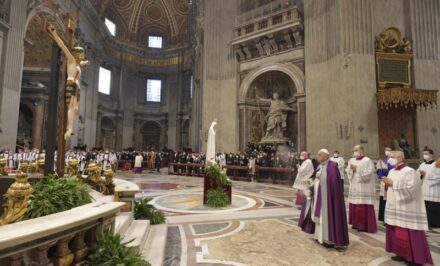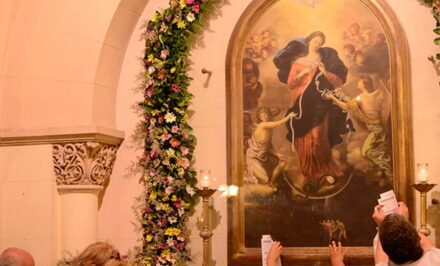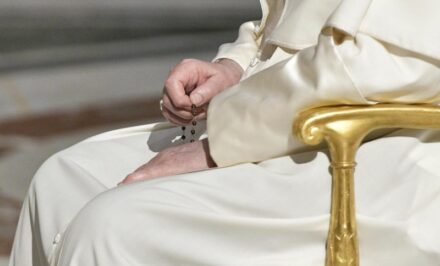
ROME/JORDAN, VIS/org – On Saturday, April 24, the Pope began his pilgrimage to the Holy Land, commemorating the 50th anniversary of the encounter between Pope Paul VI and the Patriarch Athenagoras in Jerusalem. The aeroplane carrying the Holy Father departed at 8.15 from Rome’s Fiumicino airport and landed at 1 p.m. local time, midday in Rome, in the “Queen Alia” airport of Amman, Jordan. Before leaving the airport in Rome, he tweeted: “Dear friends, please pray for me during my pilgrimage to the Holy Land.” During the flight to Amman, the Holy Father greeted the more than 70 journalists who travelled with him, thanking them for their help and service, and signalled that there would be a lot of work and commitment during this visit because they would have to see, write and think. He jokingly added that someone had written that it would be a “killer visit” because of the intense and packed program. He then indicated that he will give a press conference on the return flight.
![]()

The Pope was welcomed upon arrival by the representative of King Abdullah II, Prince Ghazi bin Muhammad, along with the Patriarch of Jerusalem of the Latins, His Beatitude Fouad Twali and the Custodian of the Holy Land, Fr. Pierbattista Pizzaballa, O.F.M. A child offered him a black orchid, the flower that symbolises the Hashemite Kingdom of Jordan. Following a brief conversation with the representative of the monarch in the Royal Pavilion, the Pope transferred by car to the Al-Husseini Royal Palace of Amman, where King Abdullah II and Queen Rania awaited him.
During Paul VI’s visit to the Holy Land in 1964, King Hussein, father of the current monarch, accompanied the Pope to the doors of Jerusalem. Abdullah II welcomed St. John Paul to the Holy Land in 2000, and Pope Benedict XVI in 2009; in return, he has been received twice by Pope Francis, first in 2013 and again in April this year.
Following a short private meeting with the king and his family, Francis entered the palace hall where he was awaited by around three hundred people, including the kingdom’s highest authorities, representatives of the diplomatic corps and the main leaders of other religions, and he gave his first address in the Holy Land. He remarked first that Jordan is a land “rich in history and with great religious significance for Judaism, Christianity and Islam”.
Text of Pope Francis’ address
Your Excellencies,
Dear Brother Bishops,
Dear Friends,
I thank God for granting me this opportunity to visit the Hashemite Kingdom of Jordan in the footsteps of my predecessors Paul VI, John Paul II and Benedict XVI. I am grateful to His Majesty King Abdullah II for his warm words of welcome, as I recall with pleasure our recent meeting in the Vatican. I also greet the members of the Royal Family, the government and the people of Jordan, this land so rich in history and with such great religious significance for Judaism, Christianity and Islam.
Jordan has offered a generous welcome to great numbers of Palestinian and Iraqi refugees, as well as to other refugees from troubled areas, particularly neighboring Syria, ravaged by a conflict which has lasted all too long. Such generosity merits, Your Majesty, the appreciation and support of the international community. The Catholic Church, to the extent of its abilities, has sought to provide assistance to refugees and those in need, especially through Caritas Jordan.
While acknowledging with deep regret the continuing grave tensions in the Middle East, I thank the authorities of the Kingdom for all that they are doing and I encourage them to persevere in their efforts to seek lasting peace for the entire region. This great goal urgently requires that a peaceful solution be found to the crisis in Syria, as well as a just solution to the Israeli-Palestinian conflict.
I take this opportunity to reiterate my profound respect and esteem for the Muslim community and my appreciation for the leadership of His Majesty the King in promoting a better understanding of the virtues taught by Islam and a climate of serene coexistence between the faithful of the different religions. You are known as a man of peace and a peacemaker: thank you! I am grateful that Jordan has supported a number of important initiatives aimed at advancing interreligious dialogue and understanding between Jews, Christians and Muslims. I think in particular of the Amman Message and the support given within the United Nations Organization to the annual celebration of World Interfaith Harmony Week.
I would also like to offer an affectionate greeting to the Christian communities welcomed by this Kingdom, communities present in this country since apostolic times, contributing to the common good of the society of which they are fully a part. Although Christians today are numerically a minority, theirs is a significant and valued presence in the fields of education and health care, thanks to their schools and hospitals. They are able to profess their faith peaceably, in a climate of respect for religious freedom. Religious freedom is in fact a fundamental human right and I cannot fail to express my hope that it will be upheld throughout the Middle East and the entire world. The right to religious freedom “includes on the individual and collective levels the freedom to follow one’s conscience in religious matters and, at the same time, freedom of worship… [it also includes] the freedom to choose the religion which one judges to be true and to manifest one’s beliefs in public” (Ecclesia in Medio Oriente, 26). Christians consider themselves, and indeed are, full citizens, and as such they seek, together with their Muslim fellow citizens, to make their own particular contribution to the society in which they live.
I thank you for your courteous and warm welcome. May the Almighty and Merciful God grant happiness and long life to Your Majesties, and may he bless Jordan abundantly. Salaam













